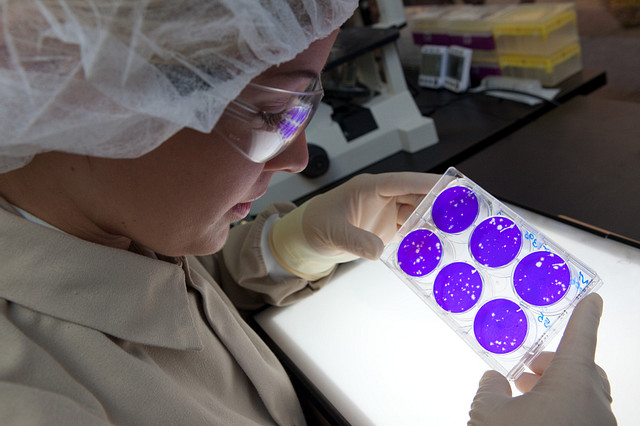A year after Distributed Bio gained fame in a Netflix documentary series about preventing pandemics, the biologics discovery contract research organization which spun out a therapeutics company focused in part on COVID-19 has been acquired by Charles River Laboratories—its collaboration partner of more than two years—for up to $104 million.
In January 2020, as COVID-19 began to wreak havoc on the world, Distributed Bio and its CEO, president, and chairman Jacob Glanville, PhD, were featured in the first season of Netflix’s “Pandemic: How to Prevent an Outbreak,” focused on efforts by doctors, researchers, healthcare workers, and public health officials to fight influenza and future global pandemics.
Glanville and Distributed Bio were featured in the Netflix docuseries for their efforts to develop a broad-spectrum “universal” vaccine technology. In January 2020, Distributed Bio spun out Centivax, a company focused on developing the universal vaccine and COVID-19 therapeutics as part of a portfolio that also includes anti-pandemic vaccines, universal antivenom, anti-infectives, autoimmunity, and oncology biotherapeutics.
In a tweet Monday, Glanville said Centivax will continue to develop those and other products: “@CRiverLabs acquires my first venture, @distributedbio! I move forward with my second venture, @centivax, with the entire therapeutics portfolio: COVID-19, universal vaccines, antivenin, anti-infectives, CXCR5, and more. Solid start to 2021.”
In response to a tweet questioning if that will result in accelerated antibody development, Glanville replied: “Helps us focus on them 100% and means I can invest personally in their success. We are also looking into a way to enable investment by the masses through NetCapital.”
$15M in revenues
Headquartered in South San Francisco, CA, privately held Distributed Bio generated estimated annual revenue of approximately $15 million in 2020.
The deal—completed Thursday and announced Monday—came more than two years after the companies launched an exclusive partnership in October 2018. The companies created a combined antibody discovery and development platform for Charles River Labs clients that integrated Distributed Bio’s libraries and optimization technologies with Charles River’s expertise in early-stage drug discovery services. The value of that partnership has not been disclosed.
“Our successful partnership has already generated significant client interest and we believe our broader platform will continue to attract new discovery business opportunities,” James C. Foster, chairman, president, and CEO of Charles River Laboratories, said in a statement.
Distributed Bio’s SuperHuman™ antibody libraries and integrated antibody optimization technologies are designed to help produce high-quality, readily formattable antibody fragments that support antibody and cell and gene therapy candidates for biopharma clients.
According to Charles River, Distributed Bio’s libraries are computationally optimized for both sequence diversity and immuno-engineering fitness based on analysis of thousands of human antibody repertoires and all known monoclonal antibodies in clinical trials, with the aim of generating several binding antibodies against every antigen tested. Distributed Bio’s computational immunology expertise is also designed to enable optimization of existing client antibodies generated through more traditional platforms, such as hybridoma or traditional phage display.
Distributed Bio’s large molecule discovery platform is intended to improve the chance of successful hit finding, reduce optimization requirements, and thus accelerate antibody discovery by several months.
Filling a gap
Foster said Distributed Bio’s large-molecule discovery platform fills a gap in Charles River’s portfolio and expands its early discovery expertise in a complex drug modality.
“By adding innovative capabilities like large molecule discovery, we are enabling our clients to remain with one scientific partner from target identification through IND filing, and solidifying our position as the leading, early-stage contract research organization,” Foster stated. “With its focus on speed and design efficiency, we believe the acquisition of Distributed Bio will enable us to build upon the more than 80 novel small molecule candidates that we have discovered for our clients, and meet our goal of eliminating an additional year from our clients’ early-stage development timelines,” Foster added.
Charles River agreed to pay $83 million cash upfront, and up to $21 million in payments tied to achieving unspecified milestones. Charles River said it financed the acquisition and associated fees through its existing revolving credit facility and cash. At the end of the third quarter 2020, Charles River reported cash, cash equivalents, and restricted cash of $247.423 million, up 48% from $166.72 million at the end of Q3 2019.
Charles River said the acquisition is not expected to have a material impact on its GAAP or non-GAAP financial results in 2021.
“We believe our clients’ willingness to outsource more of their discovery programs will be predicated on our ability to continue to add innovative capabilities to meet our clients’ critical research needs, which we are accomplishing through strategic acquisitions and our partnership strategy,” Foster added. “Distributed Bio is an example of our selective technology investments potentially becoming acquisitions after working with the target company for a meaningful period of time to provide its services to our clients.”







